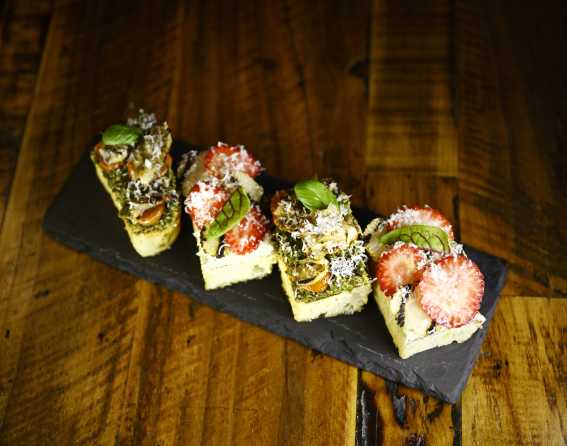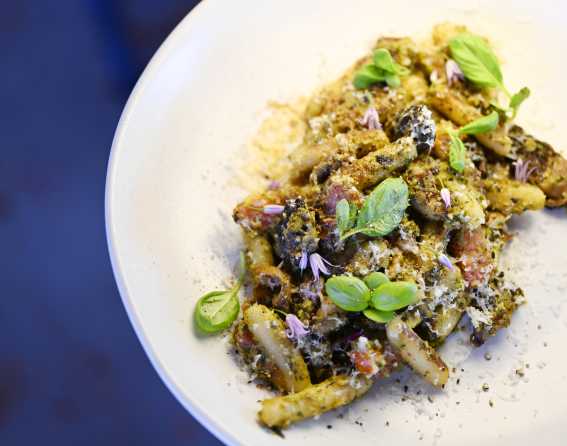Food waste is a massive problem.
According to Sam Talarczyk, director of programs and operations for Denver-based nonprofit We Don’t Waste, 40 percent of all food in the U.S. ends up going straight into the trash. We Don’t Waste is doing its part to reduce the waste, with a small fleet of refrigerated box trucks helping turn about 5 million pounds of food from 300 donors into 20 million meals annually.
A program is in the works to help streamline small donations from restaurants, says Talarczyk. “Over the past year or so, we’ve been developing a volunteer-driven food rescue program in which we onboard the donors, but then a volunteer in their own personal vehicle will actually go and recover the food, and then deliver it straight to a nonprofit agency.”
With a number of its 15 restaurants in Denver, Boulder-based Big Red F Restaurant Group has been part of the pilot program.
“Obviously, waste is a huge issue with kitchens,” says Big Red F Executive Chef Kyle Mendenhall. “Probably 85 percent of our waste is actual food waste, compostable waste. Because of that, compost is a big thing that we focus on.”
However, composting isn’t always logistically possible, says Mendenhall, meaning the restaurants seek to use everything possible in-house. And when it can’t, it’s working with We Don’t Waste to get good food to people who need it.
Several of Big Red F’s eateries, like The Post Chicken & Beer locations in Denver and elsewhere, end up with a surplus tray of mashed potatoes or other extras on a regular basis.
“We Don’t Waste picks up from us weekly, and with a couple of restaurants, it’s twice a week,” says Mendenhall. “They’re able to take those down and break them down into individual portions or portions for families to reheat and reuse.”
It adds up: From June 2022 to September 2023, Big Red F donated more than 40,000 servings to We Don’t Waste.
“It’s cool when it comes together, but it’s not easy work,” says Mendenhall. “It’s not less work, it’s more work.”
Look for We Don’t Waste’s restaurant program to go wide in late 2023.
“Denver’s a really conscious city when it comes to this issue, so everybody is interested,” says Talarczyk. “It’s just about the logistics and making it work.”
Other Denver Restaurants Aim to Reduce Waste
While it's not easy, other local restaurants are also on the forefront with zero-waste being the goal. Chef Kelly Whitaker recently received Michelin stars as well as green stars for two of his restaurants, The Wolf's Taylor and Brutø, to highlight their commitment to excellence and sustainable practices. Establishments all over town are reducing their environmental footprint as much as possible. Edible Beats, the parent company of Root Down, Linger, Vital Root, Ophelia's Electric Soapbox and El Five, has been blazing the trail with vegetable-forward menus, launching a hydroponic farm and utilizing 100 percent wind energy. The restaurant group was founded by Justin Cucci, who describes himself as a "stealth-health" chef. The company also cuts down on waste by getting rid of single-use prep containers by re-inventing kitchen scraps and using compostable storage bags and gloves. —Nate Ferguson
Terence Rogers knows these challenges well by running TBD Foods, a catering company he started in Denver in 2018.
“You end up with a good amount of waste,” says Rogers. “I’d cook with it and give it away to people, but at some point, I couldn't keep up with it.”
He sought to start a complementary business that could use the waste and opened Sullivan Scrap Kitchen out of TBD Foods’ commissary kitchen in 2019.
“We just sold sandwiches with our leftover catering ingredients one day a week,” says Rogers.
It was a hit and led to the opening of a full restaurant in Denver’s Uptown neighborhood in 2020.
“Initially, we focused on doing sandwiches and tacos and soups and more casual stuff,” says Rogers. “We were trying to rely solely on leftover ingredients from catering, then we got busier and busier and that was not a feasible option. We had to buy other ingredients in order to be able to offer a full menu.”
As lunch expanded to “elevated food” for dinner, “We allowed ourselves a lot of flexibility with the menu,” says Rogers. “With the house salad, instead of saying certain specific vegetables in there, we’ll say seasonal vegetables.”
“Every week we have our back-of-house team meeting where we’ll look at points of waste. What we’re really trying to do with zero food waste is create a closed-loop system.”
Take the Caesar dressing. Instead of anchovies in Caesar dressing, the kitchen repurposes smoked trout from catering operations.
Or the Scrap Burger: The restaurant buys half a cow at a time and uses the prime cuts for entrees, then turns the trim into burgers. Buying a comparable quality of meat for burgers would otherwise be cost-prohibitive, says Rogers.
“We’d have to charge $30 a burger, but getting half an animal at a time keeps our costs low and we pass that onto our customers.”
He also points to their so-called mushroom puree: “We take all of our old mushrooms and mushroom stems, and we ferment them for a week or two, then we blend all the juices and the stems, and it’s this truffle-y, aromatic, earthy mushroom puree. We can just add a spoonful of that into risotto or sauces and it creates this incredible flavor.”
“It’s mainly just being creative,” notes Rogers. “We’re trying to make sure we’re utilizing everything or trying to find ways to preserve it.”
The ethos extends beyond the food itself. There are no trash cans in the dining room, and what can’t be used by the kitchen is composted if possible.
“The goal is to be as zero-waste as possible,” says Rogers. “We throw out a five-gallon bag of trash every other day.”
It’s usually plastic from distributors, as well as a few tools of the culinary trade.
“You can’t get away from tape or latex gloves,” says Rogers. “Sharpies are a thing that are used in every kitchen. I’ve got two to three on me at all times. You’ve got to throw them away. There’s no other way to get rid of them.”
Sharpies and plastic film aside, he adds, “We’re all moving in the direction, we all want the right things, but it’s going to take some time.”
Plastic-Free Grocery Shopping
Grocery shopping generates a mind-boggling amount of plastic. Nude Foods Market in Boulder is setting a new standard to solve that. Most of their products are sold in glass jars that can be returned for a refund. Or you can simply keep the jars for your own purposes. You can also bring your own containers. Pack a big one for the tortilla chips, which are exceptional. They have everything you'd find in a traditional supermarket like baking supplies, coffee, tea, produce and meat, but the catch is that you have fewer choices. However, the store has a committee of taste testers. They might have one version of white rice but it's the best rice they can find. They also visit the local farms where they source products. You might think that you have to pay more for doing something right for the environment, but they often beat larger outlets like Whole Foods in prices. They do deliveries to Boulder County and certain zip codes in Denver. Nude Foods also offers cleaning and personal care products. Nude Foods is opening a new location in Denver located in the Berkeley neighborhood. Check out other zero-waste markets in the Denver metro area. —NF





